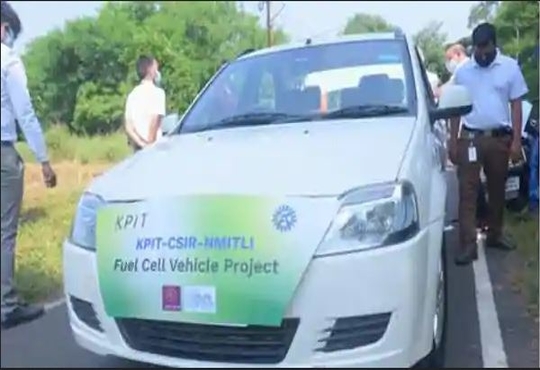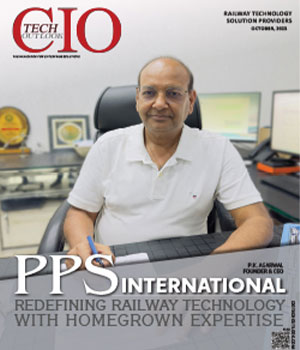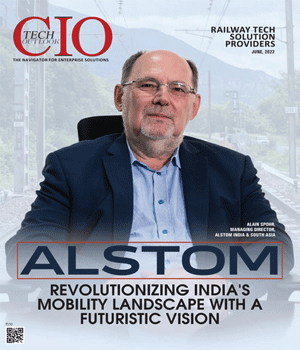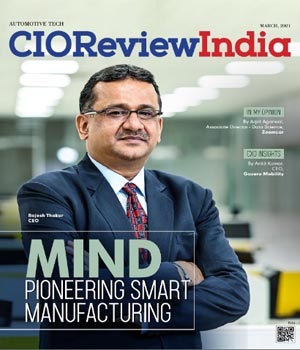
Trial Run Of India's First Hydrogen Fuel Cell Car Successfully Conducted By CSIR, KPIT
CIOReviewIndia Team | Monday, 12 October 2020, 05:13 IST
 India’s first Hydrogen Fuel Cell (HFC) prototype car that runs on an indigenously developed fuel cell stack at CSIR-Pune (Council of Scientific and Industrial Research) has been tested by the CSIR and KPIT. The trial was successfully completed. Operating at 65-75 degree centigrade, the fuel cell is a low temperature PEM (Proton Exchange Membrane) type fuel cell and is suited best for vehicular applications.
India’s first Hydrogen Fuel Cell (HFC) prototype car that runs on an indigenously developed fuel cell stack at CSIR-Pune (Council of Scientific and Industrial Research) has been tested by the CSIR and KPIT. The trial was successfully completed. Operating at 65-75 degree centigrade, the fuel cell is a low temperature PEM (Proton Exchange Membrane) type fuel cell and is suited best for vehicular applications.
A 10 kWe automotive grade LT-PEMFC fuel cell stack is successfully developed by CSIR and KPI, which is based on CSIR’s know-how. PEM fuel cell technology includes a membrane electrode which is its primary technology, and is entirely CSIR known. Bringing in their expertise in stack engineering, including light-weight metal bipolar plate and a gasket design, balance of plant (BoP) development, system integration, control software and electric powertrain for running the fuel cell vehicle, KPIT showed their expertise.
The fuel cell stack integrates extremely thin metal bipolar plates, which reduce the stack weight almost by two-thirds.
In 2016, CSIR-NCL and CSIR-CECRI, being part of the Industry Originated Project (IOP) category of the New Millennium Indian Technology Leadership Initiative (NMITLI) scheme partnered with KPIT to develop an automotive grade PEM Fuel Cell Technology. The Hydrogen Fuel Cell (HFC) technology uses chemical reactions between hydrogen and oxygen (from air) for generating and eliminating the fossil fuel usage.
Moreover, emitting only water, the fuel cell technology reduces the emission of harmful greenhouse gases in addition to other air pollutants.
The trials were conducted on a battery-electric passenger car platform, which is retrofitted with the fuel cell stack. But it is also expected that the technology is highly suited for commercial vehicles like buses and trucks as battery electric buses/trucks require a large battery to accomplish the desired operation range and the HFC technology requires a much smaller battery for a very large operating range. HFC technology gives more promise for the commercial vehicles.
With a Type III commercial hydrogen tank, the FC vehicle is fitted and its capacity is 1.75 kgs of H2 stored at about 350 bar pressure. The FC vehicle is expected to run for approx. 250km range under the typical Indian road conditions at moderate speed. Associated components with power train and the entire fuel cell stack were retrofitted in a standard 5-seater sedan car.
"The technology has a great future and owing to its indigenous development, is expected to be more commercially viable than ever before. It is an important technology that will help India significantly reduce pollution and reduce our fossil fuel imports,” said Ravi Pandit, Chairman, KPIT.
“The time has come for renewable energy based on hydrogen as fuel to power transportation in the country. This will not only reduce the petrol, diesel import bill but hydrogen is the cleanest fuel with water as the only by-product. A long term investment of CSIR under NMITLI in a niche energy area has come to fruition,” said Prof. Ashwini Kumar Nangia, Director, CSIR-NCL.
CIO Viewpoint
National Technology Day 2025: Powering Progress...
By CIOTech Outlook Team
Aligning IT Roadmap with Business Objectives: A...
By Subhash singh Punjabi, CISO & Head Enterprise Architecture, Deepak Fertilisers & Petrochemicals Corporation Ltd
Empowering Women: Shaping the Future of Industry
By CIOTechOutlook Team
CXO Insights
Tech Landscape of In-Cabin Experiences and...
By Sanjay Saha, India Country Manager, Synaptics
3 Focus Areas For An Autonomous Driving Revolution
By Varun Chhabra, Vice President, Product Marketing Cloud, Dell Technologies
The Electrified Car Industry Must Reimagine its...





.jpg)
.jpg)
.jpg)




